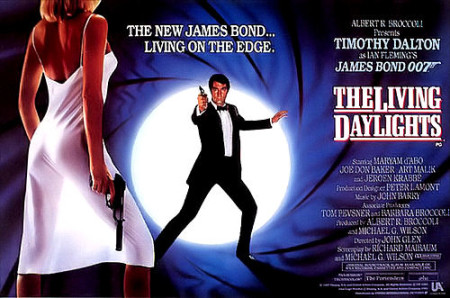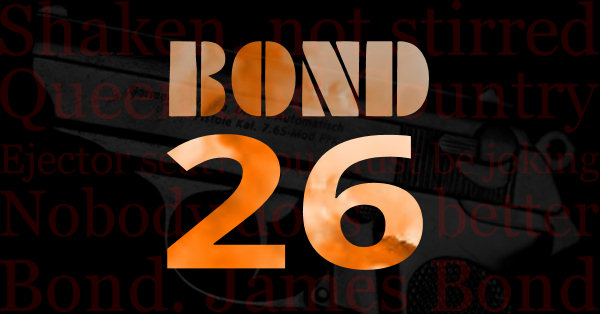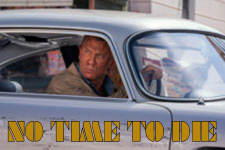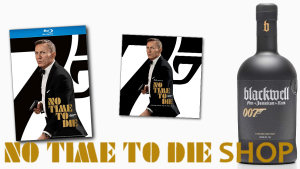There is a beautiful moment during The Living Daylights (1987). Georgie Koskov delivers a certain diatribe about his senior’s admiration for a more autonomical style of rule, much to M’s chagrin. Following such a melodramatic performance, Timothy Dalton swiftly blows a ring from his cigarette. The symbolism is obvious; James Bond can see Koskov is blowing smoke.

It’s a tiny moment like this that shows just how committed Timothy Dalton was to the role of James Bond. Firstly, it shows how much he explored the mindset of Ian Fleming’s literary character, emulating something as innocuous as the character’s smoking habits. Secondly, it showed, for the first time in the series the manner in which the mind of the character worked non-verbally, with attention paid to nods, smiles, shrugs and puffing.
A theatre actor of the highest calibre, Dalton brought Bond back to the books. Gone were the double entendres that had littered the series. Gone were the eyebrow raising. In came introspection and doubtfulness. Dalton, unlike his predecessor Roger Moore (and to a lesser extent, Sean Connery), took the part seriously.
“You can’t believe in a superman,” he repeatedly told journalists. If he was going to play a secret agent, he was going to play one as if he were one, not a glamorous rock star living the high life. That meant having to swallow his pride despite the incompetency of his superiors and show angst at the sight of a fallen colleague. Long before Daniel Craig brought the series back to reality, Dalton pointed his finger in that direction. Where Craig won a ‘British Artist of The Year’ Award in 2012, Dalton found himself the victim of tabloid headlines condemning his appearance instead of the other credible candidate, Pierce Brosnan.
But Daylights is all the better for Dalton’s appearance. Brosnan may be better looking than Dalton and wears Brioni with panache, but Glasnost thriller Daylights needed someone with more vitality and intensity than a star from Hollywood. An actor who looked like he was actually going to kill General Pushkin, given the chance. An actor who looked like he was beginning to fall for the lady cellist he had under his custody, even if he didn’t convey it in words. A man who looked panicked as his colleague Saunders was assassinated in Vienna.
It’s a wonderful facial performance, Dalton’s visual shock and horror as he watches a man he only made amends with seconds beforehand die. It’s not a moment of recent outings (far from Moore in a clown suit), harkening back to Dr No and From Russia With Love, not uncoincidentally, Dalton’s favourite entries in the series.
As he hisses “I got the message” with cool hesitation, for the first time, audiences are invited into the mind of Bond. Naked ladies are not the only thing that keep Bond awake at night. Martin Campbell pushed this further in Casino Royale (2006) with his expositional shots of Bond composing himself in bathrooms after cold blooded kills, but for the 1980s this proved a ballsy move, a credit to Dalton and director John Glen for pushing this demon-laden Bond to the big screen.
Much of Dalton’s immersion in Fleming’s character came from his more romantic demeanour. Alone with Kara Milovy (Maryam d’Abo), Bond asks them to be put in two separate rooms so he can gain her trust and support. Given that Sean Connery had slept with four women in You Only Live Twice alone, such a progression further showed Dalton’s commitment to the role; his interest in character outweighed his interest in titillation.
Dalton again showed an intimacy with Carey Lowell’s Pam Bouvier, their romance heightened with sweet nothings “Why don’t you wait until you’re asked/why don’t you ask me?” another refreshing change from the constant innuendo of the Moore films. Dalton may not have had the same sex appeal as Daniel Craig or Sean Connery, but his romantic charm and Byronic handsomeness gave his film´s an earnestness and touch of sweetness, one that only George Lazenby (the other maligned Bond) shared in his portrayal.
Dalton next got to star in another film, one specifically written for his strengths. Licence To Kill (1989) shook audiences in a way it had never been shaken before, perhaps the reason why its box office receipts were less than stellar. Despite the film’s flaws (appalling costume changes, questionable supporting cast and over reliance on eighties movie clichés among others), Dalton really sells himself here.
Rejecting the piteous quips entirely (Dalton stuttered one or two out in Daylights, much to his audible chagrin), Dalton showed just how nasty Bond really could be. Hair combed back, mouth largely closed, eyes tightened, Dalton truly comes across as a killer par excellence.
“I’m more of a problem eliminator,” he utters, and he means it. Watching a helpless man hold for dear life over a crevasse of sharks, Dalton’s sneer is palpable as he throws a suitcase of money on top of him, his eyes leering over him with repulsion and vindication for the disservice this person did to their colleague Felix Leiter.
These eyes come into motion again later in the film as Bond finds himself captive to Franz Sanchez. Drinking his wine, Dalton lilts his head in admiration; he recognises he could very well turn out like Sanchez. It’s a direct allusion to the Fleming novels of old, a la Casino Royale and Live and Let Die where Bond admires his own mirror reflection.
Craig would later use his eyelids to show pain in his films, and Moore gave one fleeting icy stare in The Spy Who Loved Me to shut Anya from delving into his personal life , but as a non-verbal expressionist, arguably Dalton used his eyes and stares the most effectively; again, a trait of Fleming’s cold, introverted creation.
As well as non-verbal acting, Dalton further showed the pain of the character in Licence’s wonderful vehicular climax. Doing much of the stuntwork himself, this scene has an intensity to it not seen again, until Casino Royale. Shirt torn, fist fighting fist, Dalton throws himself into the action with gusto, falling bloody and bruised.
As he lies face in the desert, we find ourselves feeling a curious feeling for Bond: frightened. Bloodied and battered, his killing of Sanchez is more of a happy coincidence than ingenuity, though it leaves the broken assassin crying tears of relief. Critics applauded Craig´s efforts when he cried holding Judi Dench’s M at the close of Skyfall, claiming Bond was in fact a human being, again forgetting that Dalton did much the same twenty three years earlier!
But, like the literary character when talking to Honey Ryder and Vivienne Michel, he finds time to appreciate what others have done for him. Dalton’s smile, when it comes, is infectious as he thanks Q for all the help he has given him. It´s a tender moment, made all the more moving by its seldom nature, making it all the more meaningful. It might have taken nearly twenty years, but Fleming’s Bond was finally back on screen, turning to the past to point to the future of Bond films. That they didn’t continue this way is one of bigger missed opportunities the series has encountered to date.
Sadly, Dalton did not have all the time in the world. Extended litigation meant his third proposed film was cancelled, before he publicly opted for early retirement in 1994 as pre-production for a new film fell into place.
Pierce Brosnan took the role, turning his debut Goldeneye into a critical and commercial smash. But it was a venture that harkened to the glory days of Connery and Moore; a replication, instead of something new. As he progressed, his films grew worse and worse.
Following the release of the series nadir Die Another Day, Brosnan found himself unceremoniously replaced by Daniel Craig, a man who brought grit and emotional pain to the character, something Dalton had started back in 1987. Despite chronological placement, it was Dalton, not Brosnan, who proved to be the prototype for the 21st century Bond.










April 21st, 2015 at 22:49
Totally agree with the analysis of Dalton’s portrayal. If the scripts had been 10% tighter, losing the tired remnants of frivolity that squeezed their way in, these would be perfect Bond films thanks to Dalton’s work. I might have phrased the last sentence of the penultimate paragraph (re: Brosnan) “As his portrayal progressed, the films around him grew worse and worse” as Pierce exhibits occasional subtle mannerisms and “business” that suggest he understood the role far better than the filmmakers supporting his efforts did. Ultimately an extremely dire and disappointing waste of a talented actor, with “Die Another Day” surpassing even “Man With The Golden Gun” and its squandering of Christopher Lee in that regard. Points added to DAD, however, for committing to celluloid history just how remarkably bad Madonna is at everything, with her “performance” sucking the air right out of that already meager entry.
April 22nd, 2015 at 00:38
I too agree about the underappreciation of Dalton as Bond. He’s always in my top three Bonds–maybe even top two. Not only are he and Craig the toughest Bonds, they are simultaneously the most tender. One believes the relationships with the women.
April 22nd, 2015 at 17:57
Pierce Brosnan took the role, turning his debut Goldeneye into a critical and commercial smash. But it was a venture that harkened to the glory days of Connery and Moore; a replication, instead of something new. As he progressed, his films grew worse and worse.
Too true. There is a feeling of going backwards with the Brosnan ones. i believe the Craig ones will be a ‘new golden age’ and that started with Dalton.
May 7th, 2015 at 06:41
I Think Timothy Dalton was a great bond because he was theatre trained and is a old style actor that delves into the character before playing it. He was before his time playing Bond and audiences hadn’t caught up to that style in the 80s they still had the Roger Moore hangover. Roger Moore was good for bottom line profit but as his films went on they got more and more silly Dalton brought it back to realism and made Bond human again. Unfortunately he didn’t go on after two outings I think the ten years that Brosnsn played the role were boring and very one dimensional films Judy Dench played a far better character and next to Brosnan showed how bad Brosnan was. Unlike one of the comments here I believe he didn’t really have the understanding of the character in the same way that Connery or Dalton or Craig did or do. Thank God the producers saw that a change was needed because if we had to sit through another Brosnan helmed Bond film I was ready to stop watching. Still even to this day I feel the scripts are still letting the film down there is still a lot of lack of flow in the films different scenes don’t join well and they are missing pieces of the puzzle in many areas even in Skyfall this happens I don’t know why they continue to let this happen. Its like they take it filmimg of it so far then run out of time and throw the rest together and hope it makes a good story I would prefer they take more time and get it 100% right the early films do this I guess as bond gets handed down generation to generation some of the art of picture making gets lost. Terrance Young Lewis Gilbert and Guy Hamilton 3 of the best directors last century tall order to follow in this day and age. I should put Ken Adam in there he is a legend production Designer without him 007 would have not lasted to now.
May 7th, 2015 at 08:00
Timothy Dalton brought an undeniable intensity to the Bond persona. Gone were the quips from double meanings of phrases and words from previous films. Now we had a Bond that would challenge the Majesty’s Secret Service on principal and duty. My only disappointment with Dalton was the person who did his hair in License To Kill as his hair looked terrible in some of the scenes. What a shame as he is a very good looking man. Am I right ladies?
May 7th, 2015 at 18:25
Excellent article! It’s such a shame that so many fans of the movies have never read the books and always rush to name Connery as the best Bond ever, as if he invented the series. Living Daylights is one of the top films. The only one that really surpasses it is Casino Royale. And I love that you mention Lazenby as one of the great unsung Bonds. It’s such a shame that listened to a “friends” advice and gave up the role before OHMSS even premiered. (For those who don’t know what I’m referring to, watch Everything or Nothing, an excellent documentary with several interviews with actors and crew from over the years.) Lazenby’s continuation would have saved us from the Moore years.
July 24th, 2015 at 09:50
Nice article. Dalton will always be my favourite Bond as I felt he portrayed the character the best. Craig is doing a great job, in much the same fashion. I also feel Lazenby would be thought of differently if he had only done one more Bond.
September 22nd, 2015 at 20:57
Damn good piece!
Love the ending “Following the release of the series nadir Die Another Day, Brosnan found himself unceremoniously replaced by Daniel Craig, a man who brought grit and emotional pain to the character, something Dalton had started back in 1987. Despite chronological placement, it was Dalton, not Brosnan, who proved to be the prototype for the 21st century Bond.”